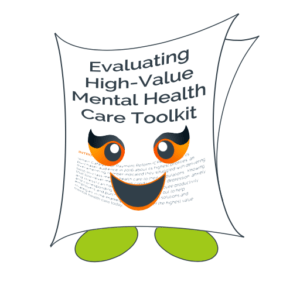For the past three years, Suzanne Delbanco and other CPR staff have interviewed health care thought leaders as part of CPR’s Listening In (With Permission) podcast. Each new podcast garners hundreds of listens. At CPR, our “tools” i.e., model contract language, how-to guides, and toolkits, want some of the spotlight.
Born out of the COVID-19 pandemic is a new CPR blog series that profiles the unique personalities of CPR’s different tools that are free for employer-purchasers to download and use. We’ll ask our tools the important questions – from what makes them relevant to purchasers in the current situation to who their friends are. Yes, we are aiming for a touch of levity. After all, with a little humor, there is healing.
CPR Resource: Evaluating High-Value Mental Health Care Toolkit
What is one adjective that describes you? Attentive.
How did you come into existence? A group of eight employer-purchasers participated in a round table (we call them “collaboratives”) during which they discussed aspects of high-value mental health care. The group developed specifications with which purchasers could evaluate mental health solutions across three categories – access to care, quality of care, and integration with primary care. With the evaluation questions and criteria, CPR evaluated 16 vendors who offer mental health solutions, including health plans, employee assistance programs, tele-behavioral health vendors, digital mental health solutions, and care navigation solutions. CPR released summary scorecards on the vendors to CPR members, sharing findings from the evaluation, and released me to CPR’s broader purchaser audience.
Why are you relevant right now? The need for high-value mental health support is extremely relevant in the midst of COVID-19, so much so that the Substance Abuse and Mental Health Services Administration’s (SAMHSA) Disaster Distress Hotline reported an 891% increase in calls during March 2020 compared to the prior March. Employees and their dependents may be stressed about themselves or a loved one contracting COVID-19. Organizations have had to lay off or furlough employees, resulting in anxiety over finances and health care coverage for thousands of families. Many employees are adapting to new work environments, working remotely at home while also caring for their family and keeping their children engaged during this shelter-in-place period. Perhaps some of your employees are experiencing social isolation. Whatever the cause, the stress and anxiety that many Americans are facing should not be ignored. If left untreated, these conditions can increase the risk of poor health outcomes in the future. Ensuring that plan participants have adequate access to mental health services is a priority for health care purchasers nationwide.
As a health care purchaser, you don’t have to go at it alone. Specifically, I have questions in the “Access” section that you can use to ascertain the network size, average time to see a provider, digital support and other criteria. Ask your health plan, employee assistance program, tele-behavioral health vendor, and others these questions in order to understand the level of support they are providing during this time of need. With this information, you’re armed with knowledge on how your partners are performing and where you may need to beef up plan offerings moving forward.
Who are your best friends and why? My best friends are probably the State of the Mental Health Marketplace Report and the virtual summit recording “How Employers are Demanding Better Mental Health Care.”. We’ve been together from the beginning. For dealing with COVID-19, my newest friend is SAMHSA’s COVID-19 resource page.
What’s next? I’m looking forward to Mental Health Month, just around the corner in May. Do you know of any events focused on helping employers address the mental health needs of their plan participants? Tag @CPR4Healthcare on Twitter to let us know!

